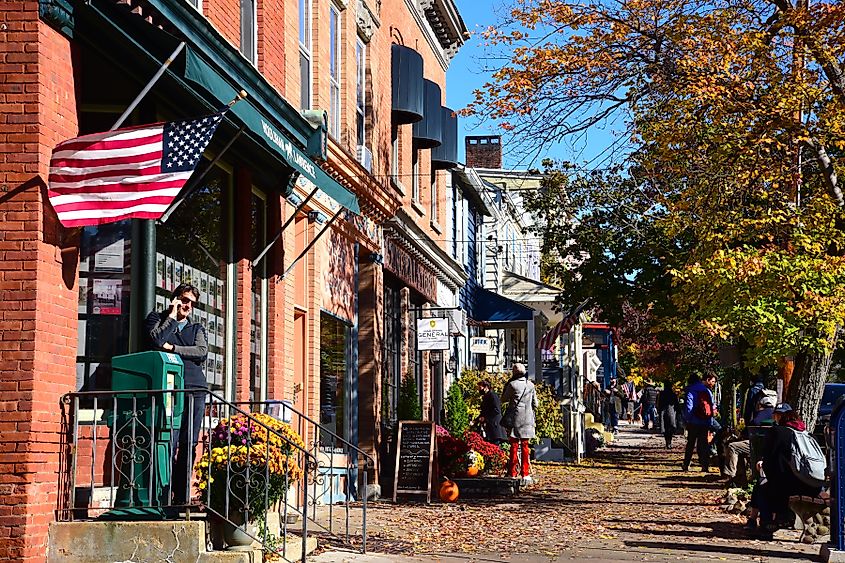Why Small Towns are Ideal for Entrepreneurs
Small towns offer a unique set of advantages that make them an attractive location for entrepreneurs looking to open a business. One of the primary benefits is the lower overhead costs associated with starting and running a business in a small town. With lower rent, utility, and labor costs, entrepreneurs can allocate more resources to developing their business and reaching their target market. Additionally, small towns often have a stronger sense of community, which can lead to a loyal customer base and positive word-of-mouth advertising.
Another advantage of opening a business in a small town is the more relaxed pace of life. Unlike large cities, small towns tend to have less traffic, noise, and stress, creating a more conducive environment for entrepreneurs to focus on their business. Furthermore, small towns often have a more personalized approach to business, with owners and customers developing close relationships and a sense of mutual support.
For entrepreneurs looking to open the best shop in a small town, it’s essential to consider the local market and identify gaps in the existing business landscape. By understanding the needs and preferences of the local community, entrepreneurs can create a business that meets those needs and establishes a loyal customer base. Whether it’s a boutique retail store, a restaurant, or a service-based business, the key to success lies in providing unique value and building strong relationships with the local community.
Identifying the Best Business Opportunities for Small Towns
To increase the chances of success, it’s essential to understand the local market and identify gaps in the existing business landscape. This involves conducting market research to determine the needs and preferences of the local community. By analyzing the competition and identifying areas of opportunity, entrepreneurs can create a business that meets the needs of the local market and establishes a loyal customer base.
Some popular business ideas that tend to thrive in small towns include boutique retail stores, restaurants, and service-based businesses. These types of businesses often have a strong appeal to local residents and can help to create a vibrant and diverse downtown area. For example, a boutique retail store that specializes in local products and gifts can help to attract tourists and support the local economy.
Restaurants are another popular business idea in small towns, as they can provide a unique dining experience and help to create a sense of community. By offering a menu that features local ingredients and specialties, restaurants can help to showcase the best of the local area and attract visitors from surrounding towns.
Service-based businesses, such as salons, spas, and pet groomers, are also in high demand in small towns. These types of businesses often have a loyal customer base and can provide a steady stream of revenue. By offering a unique and personalized service, entrepreneurs can help to build a strong reputation and establish a successful business.
When it comes to finding the best shop to open in a small town, it’s essential to consider the local market and identify areas of opportunity. By conducting market research and analyzing the competition, entrepreneurs can create a business that meets the needs of the local community and establishes a loyal customer base.
How to Choose the Perfect Business for Your Small Town
Choosing the right business for your small town requires careful consideration of several factors, including your passions, skills, and resources. It’s essential to select a business that aligns with your strengths and interests, as this will help you to stay motivated and committed to your venture.
Conducting market research is also crucial in determining the best business for your small town. This involves analyzing the local market, identifying gaps in the existing business landscape, and understanding the needs and preferences of the local community. By doing so, you can create a business that meets the needs of the local market and establishes a loyal customer base.
Another important factor to consider is the competition. Analyzing the competition will help you to understand the market dynamics and identify areas of opportunity. By differentiating your business from the competition, you can create a unique selling proposition that sets you apart from other businesses in the area.
When it comes to finding the best shop to open in a small town, it’s essential to consider the local market and identify areas of opportunity. By conducting market research and analyzing the competition, you can create a business that meets the needs of the local community and establishes a loyal customer base.
Some questions to ask yourself when choosing a business for your small town include: What are my passions and strengths? What are the needs and preferences of the local community? What are the gaps in the existing business landscape? By answering these questions, you can create a business that is well-suited to your small town and has the potential for long-term success.
The Benefits of Opening a Specialty Food Store in a Small Town
Opening a specialty food store in a small town can be a highly rewarding venture, offering a unique opportunity to capitalize on the local demand for high-quality, artisanal products. As one of the best shops to open in a small town, a specialty food store can benefit from a loyal customer base and a relatively low level of competition. By offering a curated selection of gourmet foods, baked goods, and specialty items, entrepreneurs can create a destination shopping experience that attracts visitors from surrounding areas.
One of the primary advantages of opening a specialty food store in a small town is the potential for high demand. Small towns often lack access to specialty food stores, forcing residents to travel to larger cities to find the products they desire. By filling this gap in the market, entrepreneurs can establish a loyal customer base and generate significant revenue. Additionally, specialty food stores can benefit from the growing trend of foodie culture, which emphasizes the importance of high-quality, locally sourced ingredients.
Another benefit of opening a specialty food store in a small town is the opportunity to create a unique and inviting shopping experience. By incorporating local products, decor, and events into the store, entrepreneurs can create a destination shopping experience that showcases the character of the small town. This can include hosting cooking classes, wine tastings, and other events that bring the community together and foster a sense of connection.
In terms of specific business ideas, some popular options for specialty food stores in small towns include bakeries, coffee shops, gourmet markets, and specialty food stores focused on specific cuisines, such as Italian or Mexican. By focusing on a specific niche or product line, entrepreneurs can differentiate their store from larger retailers and establish a reputation for quality and expertise.
Overall, opening a specialty food store in a small town can be a highly rewarding venture, offering a unique opportunity to capitalize on local demand and create a destination shopping experience. By focusing on high-quality products, unique events, and a strong sense of community, entrepreneurs can establish a successful and sustainable business that benefits both the local economy and the community as a whole.
Creating a Unique Shopping Experience in a Small Town
When it comes to opening a business in a small town, creating a unique and inviting shopping experience is crucial for attracting and retaining customers. A well-designed store can help to establish a strong brand identity and differentiate the business from larger retailers. In a small town, where community and local character are highly valued, incorporating local products, decor, and events into the business can be a key factor in its success.
One way to create a unique shopping experience is to incorporate local products into the store. This can include sourcing products from local farmers, artisans, and craftspeople. By showcasing local products, the business can help to support the local economy and create a sense of community. Additionally, local products can be used to create a unique and authentic shopping experience that reflects the character of the small town.
Decor is also an important aspect of creating a unique shopping experience. The store’s decor should reflect the local culture and aesthetic, and can include elements such as reclaimed wood, vintage signs, and local artwork. By creating a visually appealing and cohesive store design, the business can establish a strong brand identity and create an inviting atmosphere for customers.
Events are another way to create a unique shopping experience in a small town. Hosting events such as workshops, classes, and demonstrations can help to attract customers and create a sense of community. Events can also be used to showcase local products and talent, and can help to establish the business as a hub of local activity.
Some popular ideas for creating a unique shopping experience in a small town include:
- Hosting a weekly farmers’ market or artisan fair
- Creating a “local products” section in the store
- Partnering with local businesses to offer joint promotions and events
- Offering workshops and classes on topics such as cooking, crafting, and gardening
- Creating a loyalty program that rewards customers for shopping locally
By incorporating local products, decor, and events into the business, entrepreneurs can create a unique and inviting shopping experience that showcases the character of the small town. This can help to attract and retain customers, and establish the business as a hub of local activity.
In a small town, where community and local character are highly valued, creating a unique shopping experience is crucial for the success of any business. By focusing on local products, decor, and events, entrepreneurs can create a business that is truly unique and reflective of the local culture. Whether it’s a boutique retail store, a restaurant, or a service-based business, incorporating local elements into the business can help to establish a strong brand identity and create a loyal customer base.
Building a Strong Online Presence for Your Small Town Business
In today’s digital age, having a strong online presence is crucial for any business, including those in small towns. A well-designed website and social media presence can help small town businesses reach a wider audience, stay competitive, and attract new customers. In this article, we will discuss the importance of building a strong online presence for your small town business and provide tips on how to do it effectively.
A professional website is the foundation of a strong online presence. It should be visually appealing, easy to navigate, and provide clear information about your business, products, and services. A website can also help you to establish credibility and build trust with potential customers. When building a website, consider the following tips:
- Use a simple and memorable domain name
- Choose a website builder that is easy to use and customize
- Optimize your website for search engines (SEO)
- Use high-quality images and graphics
- Make sure your website is mobile-friendly
Social media is another important aspect of building a strong online presence. Platforms like Facebook, Instagram, and Twitter can help you to connect with your customers, promote your products and services, and build a community around your business. When using social media, consider the following tips:
- Choose the platforms that are most relevant to your business
- Post high-quality content that is engaging and informative
- Use hashtags to increase your visibility
- Respond to comments and messages promptly
- Use social media analytics to track your performance
E-commerce is also an important aspect of building a strong online presence. If you have a physical store, consider setting up an online store to reach a wider audience and increase sales. When setting up an e-commerce platform, consider the following tips:
- Choose an e-commerce platform that is easy to use and customize
- Optimize your product listings for search engines (SEO)
- Use high-quality product images and descriptions
- Offer secure payment options
- Provide excellent customer service
In conclusion, building a strong online presence is crucial for any small town business. By having a professional website, using social media effectively, and setting up an e-commerce platform, you can reach a wider audience, stay competitive, and attract new customers. Remember to always keep your online presence up-to-date and engaging, and to use analytics to track your performance.
By following these tips, you can build a strong online presence for your small town business and take it to the next level. Whether you’re looking to start a new business or grow an existing one, a strong online presence is essential for success in today’s digital age.
Navigating the Challenges of Running a Business in a Small Town
Running a business in a small town can be a rewarding experience, but it also comes with its own set of challenges. From limited resources to seasonal fluctuations, small town business owners must be prepared to navigate a unique set of obstacles. In this article, we will discuss some of the common challenges that small town business owners may face and offer advice on how to overcome them.
One of the biggest challenges that small town business owners may face is limited resources. With a smaller population and limited access to funding, small town businesses may struggle to compete with larger businesses in bigger cities. However, this can also be an opportunity for small town businesses to be more agile and adaptable, and to focus on building strong relationships with their customers and community.
Seasonal fluctuations are another challenge that small town business owners may face. Many small towns rely heavily on tourism, which can create a boom-and-bust economy. To overcome this challenge, small town business owners can focus on diversifying their revenue streams and building a loyal customer base. This can include offering seasonal promotions and discounts, as well as building relationships with local suppliers and partners.
Maintaining a work-life balance is also a challenge that small town business owners may face. With a smaller population and limited access to resources, small town business owners may feel pressure to work long hours and be constantly available to their customers. However, this can also be an opportunity for small town business owners to prioritize their own well-being and build a sustainable business model.
Other challenges that small town business owners may face include:
- Access to funding and resources
- Competition from larger businesses
- Seasonal fluctuations in demand
- Maintaining a work-life balance
- Building a loyal customer base
To overcome these challenges, small town business owners can focus on building strong relationships with their customers and community, diversifying their revenue streams, and prioritizing their own well-being. They can also seek out resources and support from local organizations and partners, such as the Small Business Administration (SBA) and the Chamber of Commerce.
Some strategies for overcoming the challenges of running a business in a small town include:
- Building a strong online presence to reach a wider audience
- Offering seasonal promotions and discounts to attract customers during slow periods
- Partnering with local suppliers and partners to build a sustainable business model
- Prioritizing customer service and building a loyal customer base
- Seeking out resources and support from local organizations and partners
By understanding the challenges of running a business in a small town and developing strategies to overcome them, small town business owners can build a successful and sustainable business that benefits both themselves and their community.
Conclusion: Turning Your Small Town Business Vision into a Reality
Opening a successful business in a small town requires careful planning, research, and execution. By understanding the advantages of small town entrepreneurship, identifying the best business opportunities, and creating a unique shopping experience, you can set your business up for success. Additionally, building a strong online presence and navigating the challenges of running a business in a small town are crucial for long-term success.
Remember, the key to success in a small town is to focus on building strong relationships with your customers and community, and to prioritize their needs and preferences. By doing so, you can create a loyal customer base and establish a successful business that benefits both you and your community.
If you’re considering opening a business in a small town, don’t be discouraged by the potential challenges. With the right mindset, resources, and support, you can overcome any obstacle and achieve your business goals. Take the first step today by researching your local market, identifying gaps in the existing business landscape, and developing a business plan that aligns with your passions, skills, and resources.
Some of the best shops to open in a small town include boutique retail stores, restaurants, and service-based businesses. These types of businesses tend to thrive in small towns because they offer unique products and services that cater to the local community’s needs and preferences. Additionally, they often create a sense of community and social connection, which is essential for building a loyal customer base.
In conclusion, opening a successful business in a small town requires careful planning, research, and execution. By focusing on building strong relationships with your customers and community, prioritizing their needs and preferences, and creating a unique shopping experience, you can set your business up for success. Don’t be discouraged by the potential challenges – take the first step today and turn your small town business vision into a reality.
By following the tips and advice outlined in this article, you can increase your chances of success and create a thriving business in a small town. Remember to stay focused, adaptable, and committed to your business goals, and you’ll be well on your way to achieving success in the small town business landscape.






